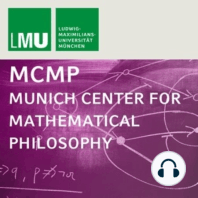74 min listen
Neuropsychology of numbers
ratings:
Length:
30 minutes
Released:
Dec 20, 2014
Format:
Podcast episode
Description
Hourya Benis-Sinaceur (Paris I) gives a talk at the Workshop on Mathematics: Objectivity by Representation (11 November, 2014) titled "Neuropsychology of numbers". Abstract: How do we extract numbers from our perceiving the surrounding world? Neurosciences and cognitive sciences provide us with a myriad of empirical findings that shed light on hypothesized primitive numerical processes in the brain and in the mind. Yet, the hypotheses based on which the experiments are conducted, hence the results, depend strongly on sophisticated arithmetical models. These sophisticated arithmetical models are used to describe and explain neural data or cognitive representations that supposedly are the roots of primary arithmetical activity. I will give some examples of this petitio principii, which is involved in neuropsychologist arguments, most time without any justification.
Released:
Dec 20, 2014
Format:
Podcast episode
Titles in the series (22)
A useful method for obtaining alternative formulations of the analytical hierarchy: Colloquium Mathematical Philosophy by MCMP – Philosophy of Mathematics
